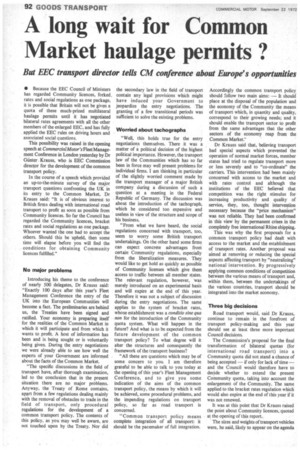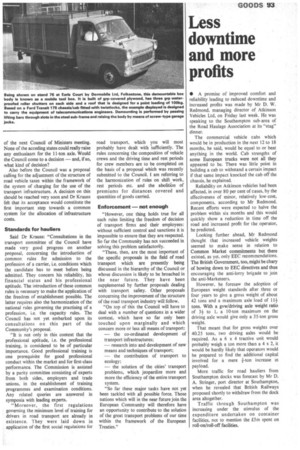A long wait for Common Market haulage permits ?
Page 92

Page 93

If you've noticed an error in this article please click here to report it so we can fix it.
But EEC transport director tells CM conference about Europe's opportunities
0 Because the EEC Council of Ministers has regarded Community licences, forked. rates and social regulations as one package, it is possible that Britain will not be given a quota of these much-prized multilateral haulage permits until it has negotiated bilateral rates agreements with all the other members of the enlarged EEC, and has fully applied the EEC rules on driving hours and associated social questions.
This possibility was raised in the opening speech at Commercial Motor's Fleet Management Conference in London yesterday by Dr Giinter Krauss, who is EEC Commission director for the development of the common transport policy.
In the course of a speech which provided an up-to-the-minute survey of the major transport questions confronting the UK in its entry to the Common Market, Dr Krauss said: "It is of obvious interest to British firms dealing with international road transport to profit as soon as possible from Community licences. So far the Council has regarded the Community licences, bracket rates and social regulations as one package. Whoever wanted the one had to accept the others. Should this be upheld, then some time will elapse before you will find the conditions for obtaining Community licences fulfilled."
No major problems Introducing his theme to the conference of nearly 500 delegates, Dr Krauss said: "Exactly 100 days after this year's Fleet Management Conference the entry of the UK into the European Communities will become a fact. The preliminaries are behind us, the Treaties have been signed and ratified. Your economy is preparing itself for the realities of the Common Market in which it will participate and from which it wants to profit. A host of information has been and is being sought or is voluntarily being given. During the entry negotiations we were already able to see how well the experts of your Government are informed about the facts of the Common Market.
"The specific discussions in the field of transport have, after thorough examination, led to the conclusion that in the present situation there are no major problems. Anyway, the Treaty of Rome contains, apart from a few regulations dealing mainly with the removal of obstacles to trade in the field of transport, only procedural regulations for the development of a common transport policy. The contents of this policy, as you may well be aware, are not touched upon by the Treaty. Nor did the secondary law in the field of transport contain any legal provisions which might have induced your Government to jeopardize the entry negotiations. The granting of a few transitional periods was sufficient to solve the existing problems.
Worried about tachographs "Well, this holds true for the entry negotiations themselves. There it was a matter of a political decision of the highest political importance. However, the transport law of the Communities which has so far been in force may well present problems for individual firms. I am thinking in particular of the slightly worried comment made by the transport manager of a major British company during a discussion of such a question at a meeting in the Federal Republic of Germany. The discussion was about the introduction of the tachograph, which he considered too expensive and useless in view of the structure and scope of his business.
"From what we have heard, the social regulations concerned with transport, too, seem to worry some British transport undertakings. On the other hand some firms can expect concrete advantages from certain Community regulations, especially from the liberalization measures. They would like to get hold as quickly as possible of Community licenses which give them access to traffic between all member states. The relevant regulation, however, was merely introduced on an experimental basis and will expire at the end of this year. Therefore it was not a subject of discussion during the entry negotiations. The same applies to the system of bracket rates, whose establishment was a conditio sine qua non for the introduction of the Community quota system. What will happen in the future? And what is to be expected from the future development of the common transport policy? To what degree will it alter the structures and consequently the framework of the transport business?
"All these are questions which may be of some concern to you. I am therefore grateful to be able to talk to you today at the opening of this year's Fleet Management Conference, and to give you some indication of the aims of the common transport policy, the means by which it will be achieved, some procedural problems, and the impending regulations on transport policy, so far as road transport is concerned.
"Common transport policy means complete integration of all transport: it should be the pacemaker of full integration. Accordingly the common transport policy should follow two main aims: — It should place at the disposal of the population and the economy of the Community the means of transport which, in quantity and quality, correspond to their growing needs; and it should enable the transport sector to profit from the same advantages that the other sectors of the economy reap from the Common Market."
Dr Krauss said that, believing transport had special aspects which prevented the operation of normal market forces, member states had tried to regulate transport more or less severely and to "co-ordinate" the carriers. This intervention had been mainly concerned with access to the market and with rates control and although the institutions of the EEC believed that competition was the right stimulus for increasing productivity and quality of service, they, too, thought intervention necessary because the "price mechanism" was not reliable. They had been confirmed in this view by the permanent crises in the completely free international Rhine shipping.
This was why the first proposals for a common transport policy had dealt with access to the market and the establishment of transport rates. Another proposal was aimed at removing or reducing the special aspects affecting transport by "neutralizing" national intervention. By progressively applying common conditions of competition between the various means of transport and, within them, between the undertakings of the various countries, transport should be integrated into the market economy.
Three big decisions Road transport would, said Dr Krauss, continue to remain in the forefront of transport policy-making and this year should see at least three more important Council decisions.
The Commission's proposal for the final transformation of bilateral quotas (for international road transport) into a Community quota did not stand a chance of being accepted if only for lack of time — and the Council would therefore have to decide whether to extend the present Community quota, taking into account the enlargement of the Community. The same applied to the bracket rates regulation which would also expire at the end of this year if it was not renewed.
It was at this point that Dr Krauss raised the point about Community licences, quoted at the opening of this report.
The sizes and weights of transport vehicles• were, he said, likely to appear on the agenda of the next Council of Ministers meeting. None of the acceding states could really raise any enthusiasm for the 11-ton axle. Would the Council come to a decision — and, if so, what kind of decision?
Also before the Council was a proposal calling for the adjustment of the structure of road vehicle taxes within the framework of the system of charging for the use of the transport infrastructure. A decision on this should be reached very soon and Dr Krauss felt that its acceptance would constitute the first important step towards a common system for the allocation of infrastructure costs.
Standards for hauliers Said Dr Krauss: "Consultations in the transport committee of the Council have made very good progress on another proposal, concerning the introduction of common rules for admission to the profession of a carrier, i.e. conditions which the candidate has to meet before being admitted. They concern his reliability, his financial status and his professional aptitude. The introduction of these common rules is necessary to make the application of the freedom of establishment possible. The latter requires also the harmonization of the national rules governing the practising of a profession, i.e. the capacity rules. The Council has not yet embarked upon its consultations on this part of the Community's proposal.
"It is not only in this context that the professional aptitude, i.e. the professional training, is considered to be of particular importance. Good professional training is one prerequisite for good professional conduct within the market and for first-class performance. The Commission is assisted by a parity committee consisting of experts from both sides, employers and trade unions, in the establishment of training programmes and examination conditions. Any related queries are answered in symposia with leading experts.
"Moreover, the first regulations governing the minimum level of training for drivers in road transport are already in existence. They were laid down in application of the first social regulations for
road transport, which you will most probably have dealt with 'sufficiently. The rules concerning the composition of vehicle crews and the driving time and rest periods for crew members are to be completed on the basis of a proposal which was recently submitted to the Council. I am referring to the harmonization of rules on shift, work, rest periods etc. and the abolition of premiums for distances covered and quantities of goods carried.
Enforcement — not enough "However, one thing holds true for all such rules limiting the freedom of decision of transport firms and their employees: without sufficient control and sanctions it is impossible to ensure that they are respected. So far the Community has not succeeded in solving this problem satisfactorily.
"These, then, are the most important of the specific proposals in the field of road transport which are presently being discussed in the hierarchy of the Council or whose discussion is likely to be broached in the near future. They have been supplemented by further proposals dealing with transport safety. Other proposals concerning the improvement of the structure of the road transport industry will follow.
"On top of this the Council will have to deal with a number of questions in a wider context, which have so far only been touched upon marginally and which concern more or less all means of transport: — the co-ordinated development of transport infrastructures; — research into and development of new means and techniques of transport; — the contribution of transport to ecology; — the solution of the cities' transport problems, which jeopardize more and more the efficiency of the entire transport system.
"So far these major tasks have not yet been tackled with all possible force. Those nations which will in the near future join the European Community will therefore have an opportunity to contribute to the solution of the great transport problems of our time within the framework of the European Treaties."
































































































































































































































































































































































































































































































































